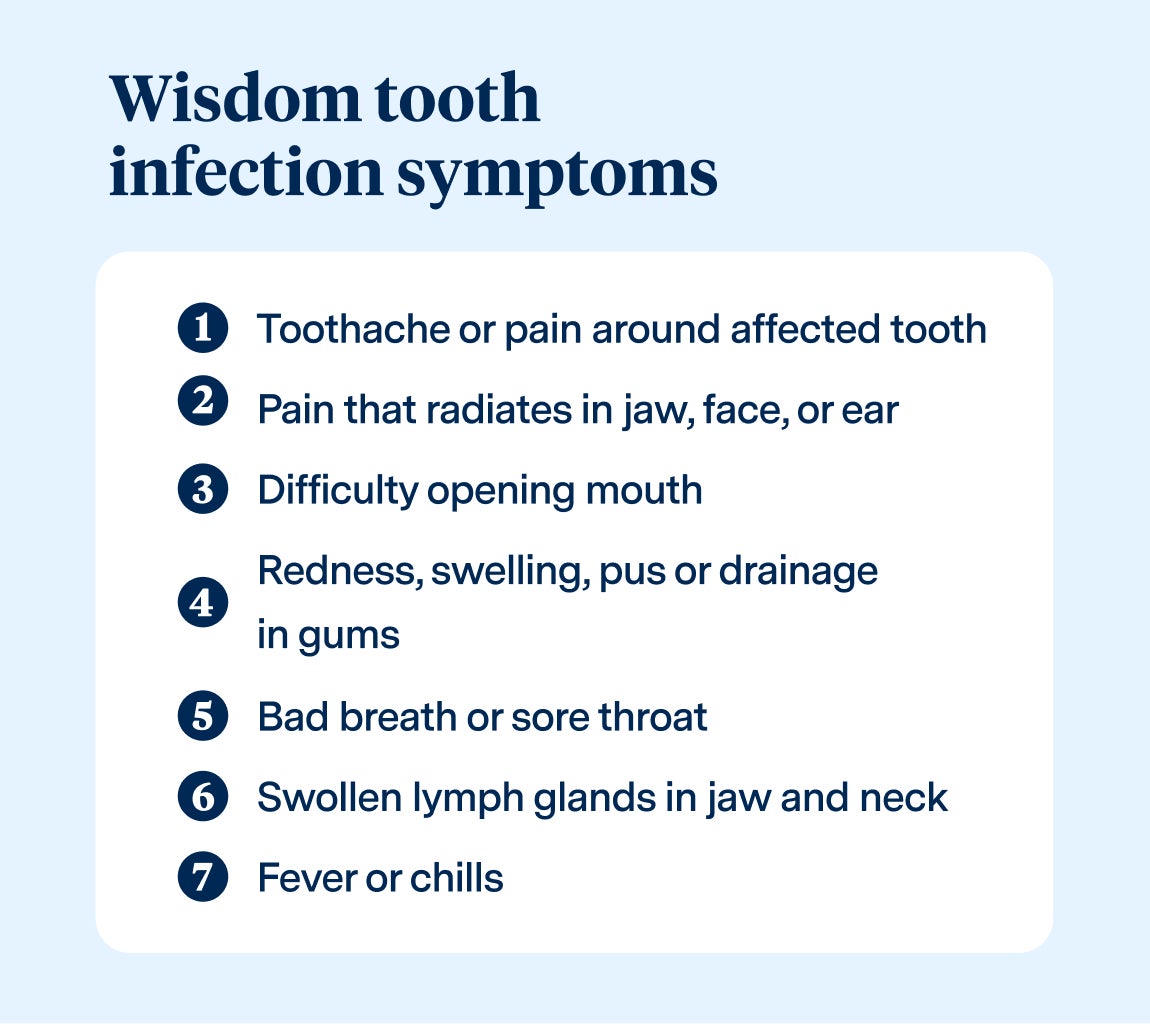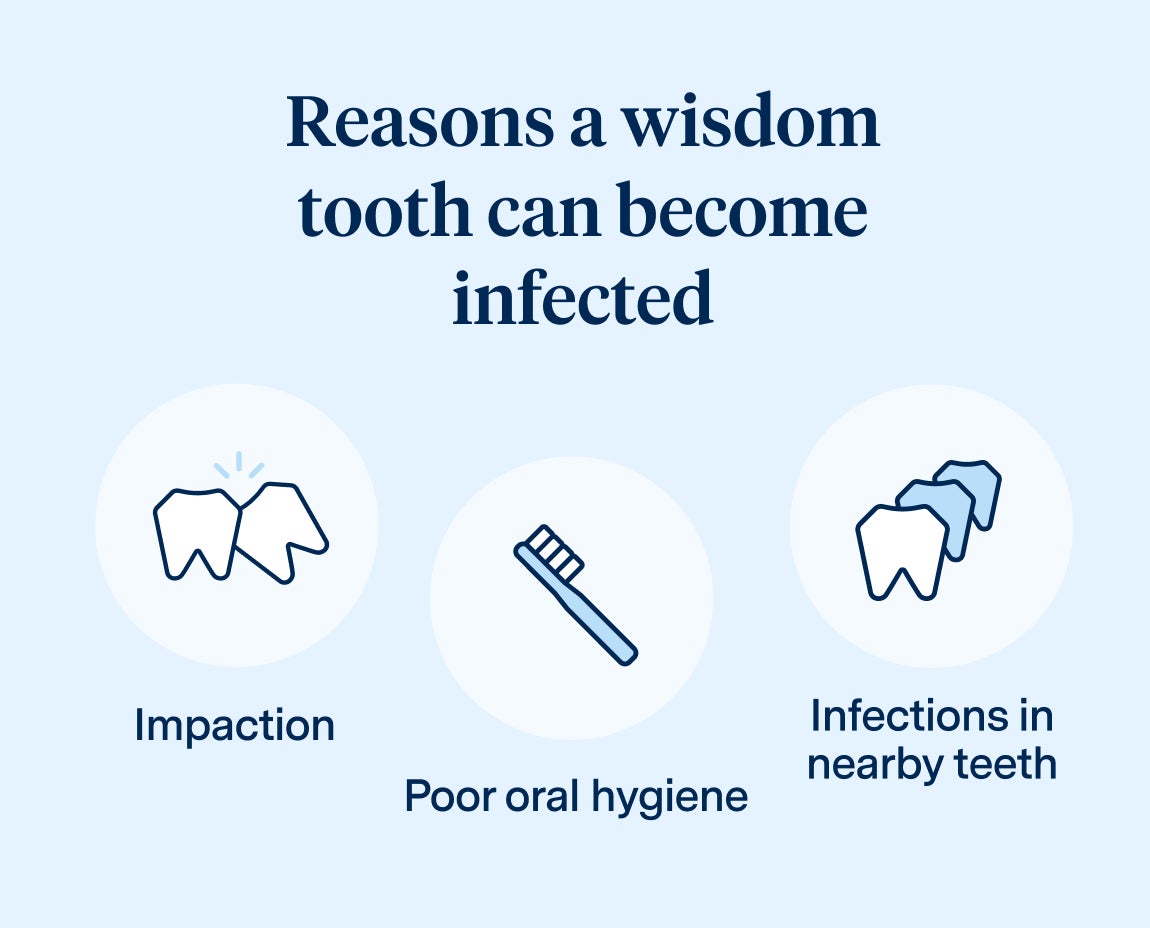Last updated 12.12.2024
Wisdom tooth infection: symptoms, causes, and treatments
Key signs of wisdom tooth infection, causes, and treatments, including extraction, help prevent severe pain.

Wisdom teeth are the third molars in the back of the mouth that typically break through the gums in your late teens or early 20s. You may be one of the lucky adults whose wisdom teeth come in without issue. But if you’re one of the many people who experience pain and discomfort with wisdom teeth, it’s important to recognize the symptoms of an infected wisdom tooth so you can get treatment quickly. In this article, we’ll explore the symptoms, causes, and treatments for infected wisdom teeth to help you identify when it’s time to schedule an appointment with your dentist.
Symptoms of wisdom tooth infection
You may experience one or several symptoms if a wisdom tooth becomes infected.
Symptoms may vary per patient, but generally they can include:
Toothache or pain around the affected tooth
Pain that radiates into the jaw, face, or ear
Difficulty opening the mouth
Redness or swelling of the gums
Bad breath
Swollen lymph glands in the jaw and neck
Fever
Sore throat
Chills
Pus or drainage from the gums
It’s important to schedule an appointment with your dentist right away if you develop any of these symptoms. Failure to address an infected wisdom tooth could create a more serious problem later.

What causes an infected wisdom tooth?
There are several reasons a wisdom tooth can become infected. The most common include:
Impaction: A wisdom tooth becomes impacted when it doesn’t have enough space to erupt through the gums. This may be due to wisdom teeth growing in sideways and running into surrounding teeth or simply not having the space to break through. An impacted tooth can allow bacteria to accumulate and eventually develop into an infection.
Poor oral hygiene: Since wisdom teeth come in at the back of the mouth, they can be difficult to brush and floss around. Failure to properly clean the area around wisdom teeth could allow plaque buildup that can create a breeding ground for infection.
Infections in nearby teeth: If a wisdom tooth becomes impacted while erupting, it can create damage to the neighboring tooth in the form of a cavity or gum infection. This can often be confused as wisdom tooth pain.

Wisdom tooth infection diagnoses
When you visit the dentist about an issue with your wisdom teeth, they may perform the following to assess the root cause of your issue and its severity and create a treatment plan.
Visual exam: Your dentist will visually inspect the tooth to see if there are obvious signs of infection, like redness, swelling, or pus. They’ll also check for swollen lymph nodes and bad breath. If your mouth looks okay after a visual exam, they may use other methods to assess the health of your troublesome tooth.
X-ray: An X-ray can help your dentist see other potential issues, like impaction, infection, or decay that’s taking place under the gumline.
CT scan: While X-rays take a two-dimensional look at the teeth, 3D scanning technology can give a more comprehensive view of how teeth are sitting alongside the jaw and surrounding tissues. This scan can provide more context about the extent of an infection, especially if the pain is severe and there’s a concern that it’s spread beyond the affected tooth. It can also show if the tooth removal will pose risk to the nerve based on its proximity.

Wisdom tooth infection FAQS
How do you know if you have a wisdom tooth infection?
You may experience symptoms like wisdom tooth pain, fever, or swelling that can indicate a wisdom tooth infection. The only way to know for sure is to visit your dentist so they can perform an examination and recommend treatment plan.
Can a wisdom tooth infection go away on its own?
A minor wisdom tooth infection may go away on its own with improved oral hygiene. However, if symptoms last longer than 48 hours, you should schedule an appointment with your dentist.
Does an infected wisdom tooth need to be removed?
Infected wisdom teeth generally need to be removed. Removing the wisdom teeth can stop the infection from spreading to other teeth and prevent future complications.
How long can a wisdom tooth infection go untreated?
It's not wise to let a wisdom tooth infection go untreated for any period. Within a few weeks or months, an infection can spread and become a more serious health emergency. When an infection spreads to the bloodstream, it can create a potentially life-threatening condition called sepsis.
Schedule a checkup at Aspen Dental if you think you may have an infection.

Get your wisdom tooth infection treated today
If your dentist determines you have an infected wisdom tooth, they may recommend various courses of action depending on your oral health.
Preventative cleaning: Before taking any drastic measures, your dentist is likely to clean the affected area, which can help remove any harmful bacteria or food particles that might be causing the infection.
Pain relief: While your dentist will dive in to resolve the root cause of wisdom tooth pain, they may also advise you to use over-the-counter pain relief, like ibuprofen, or write a prescription for a pain reliever.
Antibiotics: Your dentist may prescribe a course of antibiotics to help fight the infection. This is often done alongside a tooth extraction.
Wisdom teeth removal: Removing the wisdom tooth is one of the preferred mechanisms for treating an infection since it can help prevent future dental issues. Your dentist may recommend that you remove all four wisdom teeth at the same time so you’ll only need to go through the procedure once. The cost of wisdom teeth removal will vary depending on the number of teeth you’re having out and the complexity of the procedure. Your Aspen Dental team can walk you through the costs of removal if this is the best recommendation to resolve your infection.
A wisdom tooth infection can turn into a much more serious issue if the infection spreads. If you have symptoms of a wisdom tooth infection, contact your local Aspen Dental office. Our team can explain the causes of an infection as well as develop an appropriate treatment plan that meets your healthcare needs and budget.
Schedule appointment >



